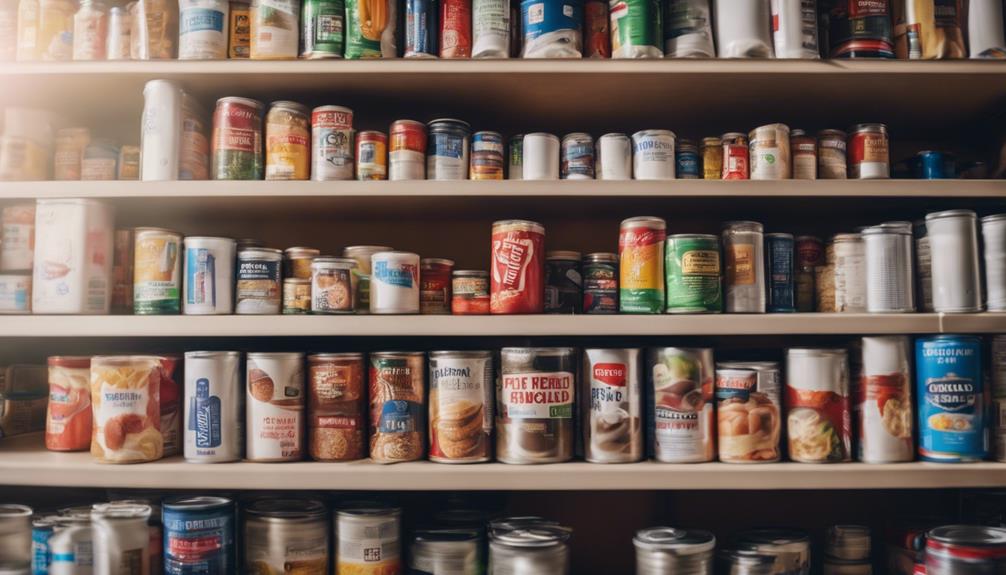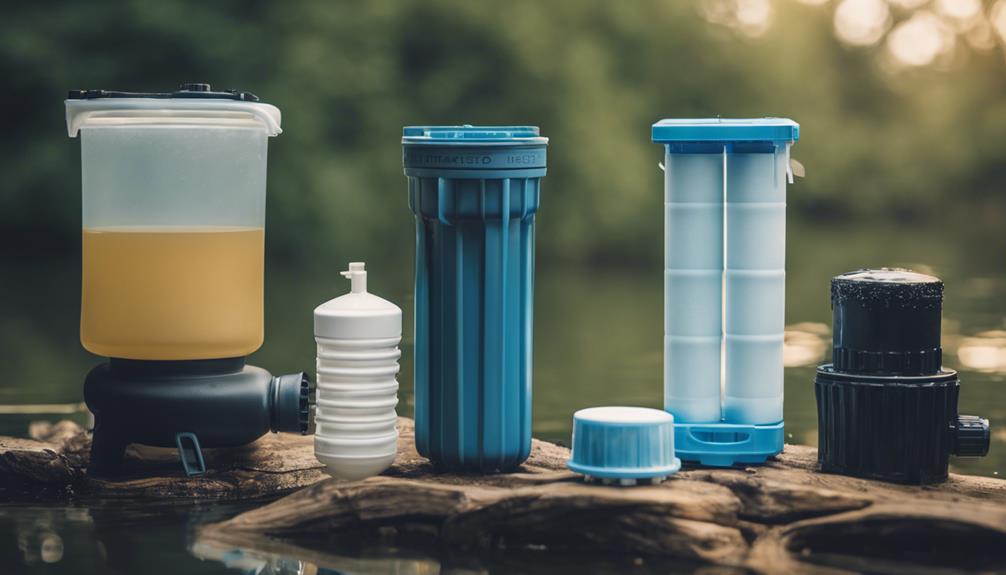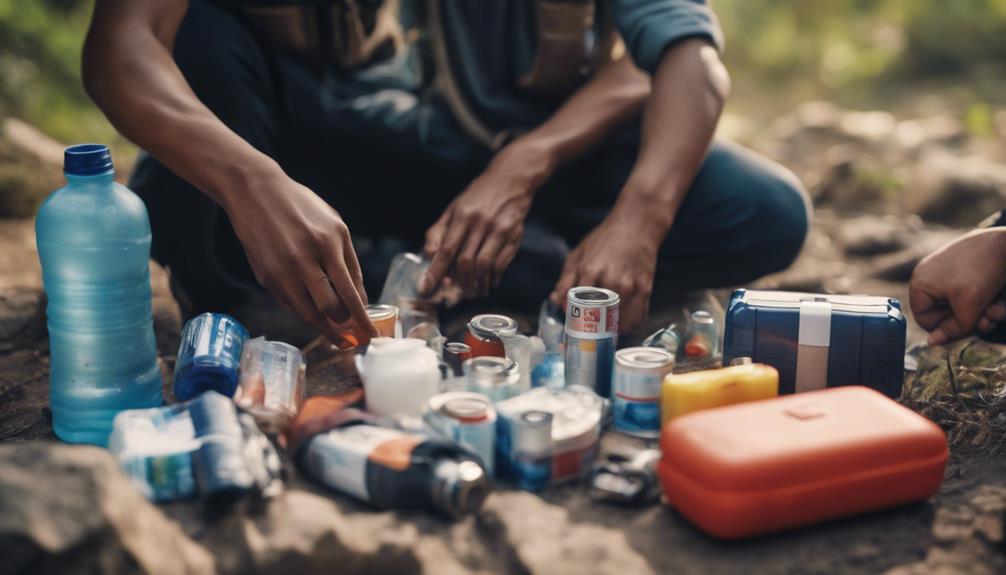When prepping, stock up on canned goods, rice, beans, and protein sources for food. Prioritize water storage containers, purification tablets, and filters for water needs. For medical supplies, have a well-equipped first aid kit, medications, and training in first aid. Shelter gear includes tents, emergency blankets, and survival tools like knives. Get tools like radios, maps, and solar chargers for communication and power. This thorough list guarantees readiness in emergencies.
Key Takeaways
- Acquire canned goods, dried foods, and staples for long-term storage.
- Prioritize water storage containers and purification methods.
- Stock up on medical supplies, first aid kits, and necessary medications.
- Include shelter prepping supplies, survival gear, and essential tools.
- Equip with communication devices, alternative power sources, and reliable lighting.
Food Stockpile Essentials
When preparing your food stockpile essentials, focus on acquiring long-lasting items like canned goods, dried foods, and freeze-dried meals. These emergency food items are vital for your prepper pantry. Additionally, it’s important to ensure you have a variety of food types to maintain balanced nutrition over time. Some of the best items to stockpile include rice, beans, and pasta, as they provide essential carbohydrates and protein while boasting long shelf lives. Don’t forget to rotate your supplies regularly to prevent spoilage and ensure freshness when needed.
Stock up on staples such as rice, beans, pasta, oats, and protein sources like canned meat and fish. These items have a long shelf life and provide essential nutrients during emergencies.
Enhance your food storage with spices, condiments, cooking oils, and sweeteners to add variety and flavor to your meals. Additionally, storing vitamins, supplements, and energy bars will help maintain nutritional balance when fresh produce is scarce.
By having a well-rounded selection of canned food and other long-lasting items in your prepper pantry, you can make certain that you're prepared for any situation that may arise.
Water Storage and Purification

Preppers prioritize water storage and purification to guarantee a reliable supply of clean drinking water during emergencies. They invest in water storage containers, such as barrels and jugs, to store large quantities of water safely.
Additionally, water purification tablets, filters, and systems are essential items in their arsenal to make contaminated water safe for consumption. Rainwater collection systems, including barrels and gutters, enable preppers to harvest and store water from natural sources for future use.
In emergencies, preppers resort to various purification methods like boiling water, using bleach or iodine, and relying on portable water filters to make certain water safety. The general rule of thumb for water storage is one gallon per person per day to meet drinking and sanitation needs during a disaster.
Medical and First Aid Supplies

To ensure thorough preparedness for emergencies, address your medical and first aid needs by stocking up on essential supplies. A well-equipped first aid kit is a must-have for preppers, containing items like bandages, antiseptic wipes, gauze pads, and adhesive tape to treat injuries effectively.
It's also vital to have over-the-counter medications such as pain relievers, antacids, allergy medication, and cold remedies on hand for various health concerns that may arise. Don't forget to include necessary medications, prescription drugs, eyeglasses, contact lenses, and specific medical equipment tailored to your individual requirements in your prepper supplies.
Additionally, obtaining training in basic first aid and CPR is essential for handling medical emergencies efficiently during survival situations. Remember to stockpile feminine care products, personal hygiene items, and other over-the-counter medications to maintain overall health and well-being in times of crisis.
Shelter and Survival Gear

Stockpile essential shelter and survival gear for thorough preparedness in emergency situations. Shelter prepping supplies like tents, tarps, sleeping bags, and extra clothing are essential for protection against the elements.
Survival gear, including emergency blankets, portable stoves, fire starters, and durable backpacks, enhances mobility and comfort during emergencies. Essential survival tools such as knives, axes, saws, and ropes play an important role in setting up shelters and securing survival locations effectively.
When it comes to shelter, preppers prioritize high-quality tents. These tents boast sturdy construction, waterproof materials, and easy setup features for quick deployment. Having a variety of shelter options—from lightweight tents for mobility to larger family-sized tents—allows preppers to adapt to different scenarios and group sizes with ease.
Tools and Communication Devices

Preppers stock up on a variety of tools like multi-tools, pliers, radios, maps, compasses, and survival books to prepare for emergencies.
Communication devices such as emergency radios, hand-crank radios, and two-way radios are vital for staying informed during disasters.
Having alternative power sources like solar-powered chargers, portable power banks, batteries, and generators is necessary to keep these devices running in times of need.
Tool Selection Tips
Consider selecting multi-tools with a variety of functions like knives, pliers, and screwdrivers to enhance versatility in emergency situations. These prepper items can be invaluable for various tasks that may arise during a crisis.
Emergency radios with multiple power sources, such as solar, hand-crank, and battery-operated options, guarantee reliable communication when other means fail. Additionally, including maps and compasses in your prepping supplies can aid navigation in case of GPS failure or lack of signal.
When stocking up on tools, don't forget to invest in headlamps, lanterns, flashlights, and spare batteries for reliable lighting during power outages or emergencies. In addition, having a portable generator as a backup power source for essential devices and appliances can prove essential during prolonged emergencies.
Communication Device Options
Enhance your emergency preparedness by incorporating a variety of communication devices into your prepping supplies. Preppers prioritize staying connected during crises, making communication tools like emergency radios essential.
In times of power outages or disasters, having emergency radios with multiple power sources such as batteries, solar panels, and hand-crank mechanisms becomes vital. Two-way radios, satellite phones, and hand-crank radios are popular choices among preppers for their reliability in maintaining communication channels. These devices offer redundancy, ensuring that you can reach out for help or coordinate with others even if one method fails.
Tools like GPS devices, maps, compasses, and whistles complement communication devices, aiding in navigation and signaling for assistance. Including a range of communication options in your prepping supplies enables you to stay informed, receive critical updates, and communicate with loved ones or emergency services effectively during challenging situations.
Maintenance and Upkeep
Incorporate a range of maintenance tools and upkeep strategies to guarantee the functionality and reliability of your communication devices during emergencies. Preppers stock up on essential tools like multi-tools, pliers, wrenches, screwdrivers, and hammers for basic repairs and maintenance tasks. These tools are essential for ensuring that your communication devices, such as two-way radios, emergency radios, and satellite phones, remain in working condition when needed most.
Additionally, having spare batteries or solar chargers on hand is important for keeping your devices powered up during extended emergencies. Prioritizing the upkeep of tools and communication devices is key to being prepared for any crisis situation. By regularly maintaining and checking your devices, you can enhance their longevity and performance, ensuring that you stay connected and informed when traditional communication channels may be unavailable.
Stay proactive in your prepper upkeep to be ready for whatever challenges may come your way.
Miscellaneous Prepper Necessities

Stock up on various prepper necessities such as garden seeds, fire extinguishers, sewing supplies, fishing gear, and entertainment items to guarantee thorough preparedness for emergencies.
Garden seeds serve as an essential component for sustainable food sources, enabling self-sufficiency during extended periods of crisis.
Fire extinguishers are important for safety measures, allowing you to swiftly tackle potential fires and protect your shelter.
Sewing supplies play a significant role in making repairs to clothing or gear, ensuring longevity and functionality in challenging situations.
Fishing gear offers a reliable means of procuring food from natural water sources, supplementing your food supplies with fresh catches.
Additionally, entertainment items like books, games, or musical instruments are valuable for maintaining morale and mental well-being during stressful times.
Frequently Asked Questions
What Do Preppers Stock up On?
You stock up on essentials like non-perishable food, water, first aid supplies, and tools for survival during emergencies. Organize with storage containers and shelves. Guarantee health with medical supplies and personal hygiene items. Have alternative power sources for electricity.
What Items Should I Stockpile for an Emergency?
For an emergency, stockpile essentials like food, water, medical supplies, and hygiene products. Include canned goods, dry foods, water jugs, first aid kits, and personal hygiene items. Don't forget tools, batteries, flashlights, and communication devices.
What Are the Top Ten Prepper Food Items?
When it comes to prepping food, you should focus on items like rice, beans, canned meats, pasta, oats, and more. These essentials offer long shelf life and nutritional value for your emergency preparedness needs.
What Food Should I Stock up on in Case of War?
In case of war, stock up on non-perishable foods like canned goods, dry items, and freeze-dried foods with long shelf lives. Include high-calorie, protein-rich foods such as canned meats, beans, rice, pasta, and energy bars.
Conclusion
To summarize, preppers stock up on a variety of essential items to guarantee they're prepared for any emergency situation. By having a well-rounded supply of food, water, medical supplies, shelter, tools, and communication devices, preppers can increase their chances of survival in times of crisis.
Remember, being prepared is key in facing the unknown with confidence and readiness. So, don't wait until it's too late – start stocking up on your essentials today!










